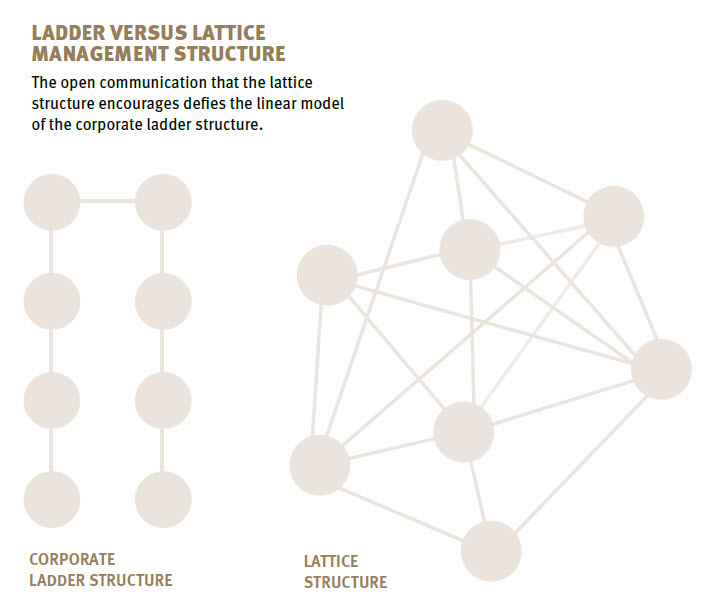Loading component...
At a glance
By Chuck Blakeman
Survey.com’s annual Wasting Time at Work report revealed that if you eliminate managers completely, you remove 75 per cent of the reasons someone will leave your company. There is a simple reason for that. They’re in the way, literally. Elon Musk knows that, and he isn’t alone.
Before Musk there was Gore
Bill Gore, co-inventor of Gore-Tex and founder of the US$3.3 billion company W.L. Gore & Associates, understood the idea implicitly and built his entire company around self-managed teams and the absence of managers of any kind. In 1976, he published a simple paper called The Lattice Organization that described how a company of any size (Gore has 10,200 staff) could run much better without managers. He expressed the simplicity of an organisation designed around the lattice concept with an illustration.
The message: collaborate with whomever you need to, whenever you need to, without ever going through a manager to get to anyone.
"You can talk to your manager’s manager without his permission, you can talk directly to a VP in another dept, you can talk to me, you can talk to anyone without anyone else’s permission.”
This brilliantly simple illustration of an organisation built around efficient and effective communications makes it very clear that if you need something from someone else in the organisation, you go to that person. If your team needs something from another team, you go to that team. In the lattice organisation, there are no managers, or inboxes and outboxes at multiple levels, or politics and departmental fiefdoms to wade through. Today, there are nearly a hundred very large companies like W.L. Gore that operate this way and thousands of smaller ones.
An enduring truth
The lattice organisation continues to spread. An internal email, revealed in late 2016 from Elon Musk to all Tesla staff, shows that Musk intuitively understands that managers add no value in pushing great ideas forward, but instead are more likely to slow down innovation, communications, and production. It’s the lattice concept clearly articulated once again, 40 years later, by a business leader of the next generation:
From: Elon Musk
To: All Tesla Staff
Subject: Communication Within Tesla
There are two schools of thought about how information should flow. By far the most common way is chain of command, which means that you always flow communication through your manager. The problem with this approach is that, while it enhances the power of the manager, it fails to serve the company.
To solve a problem quickly, two people in different depts should simply talk and make the right thing happen. Instead, people are forced to talk to their manager, who talks to their manager, who talks to the manager in the other dept, who talks to someone on his team. Then the info has to flow back the other way again. This is incredibly dumb. Any manager who allows this to happen, let alone encourages it, will soon find themselves working at another company. No kidding.
Anyone at Tesla can and should email/talk to anyone else according to what they think is the fastest way to solve a problem for the benefit of the whole company.
You can talk to your manager’s manager without his permission, you can talk directly to a VP in another dept, you can talk to me, you can talk to anyone without anyone else’s permission.
Moreover, you should consider yourself obligated to do so until the right thing happens. The point here is to ensure that we execute ultra-fast and well. We obviously cannot compete with the big car companies in size, so we must do so with intelligence and agility.
One final point is that managers should work hard to ensure that they are not creating silos within the company that create an “us vs. them” mentality, or impede communication in any way. This is unfortunately a natural tendency and needs to be actively fought. How can it possibly help Tesla for depts to erect barriers between themselves, or see their success as relative within the company instead of collective?
We are all in the same boat. Always view yourself as working for the good of the company and never your dept.
Thanks, Elon
W.L. Gore never had to send such an email, and if Musk is serious about keeping managers from being obstructionists he would do well to eliminate them altogether, as Gore and many other companies have done. But clearly Musk gets that they don’t naturally add value to the communication and innovation chains. To the contrary, their natural obstructionism must be mitigated against as a firing offence.
Loyalty to the hierarchy
Is your company addicted to serving hierarchies, or getting things done?
Musk warned that managers will get fired for even allowing communications to go through them. In almost all companies, people get fired for going directly to the source of an answer instead of paying homage and worshiping at the feet of the hierarchy. In companies with managers, Dilbert reigns, and the only solution is an email from the top of the pyramid demanding that managers stay out of the way. As Musk says and Gore illustrates, this is all incredibly dumb.
Yet most companies continue to allow managers to exist, slow things down, and gum up the works with power struggles and politics, in the face of simple logic that says they don’t add value.
Musk warns that people should get fired for getting in the middle of collaboration, yet that is at the very core of a manager's job – to get in the middle of everything.
Unencumbered communications
Do you want yours to be a great company with 100 per cent engagement where everyone works for the company, instead of some incredibly dumb, departmental fiefdom? Eliminating the requirement to communicate through managers is a great step in that direction.
A hundred large companies and thousands of smaller ones have already figured that out.
It’s your turn.


